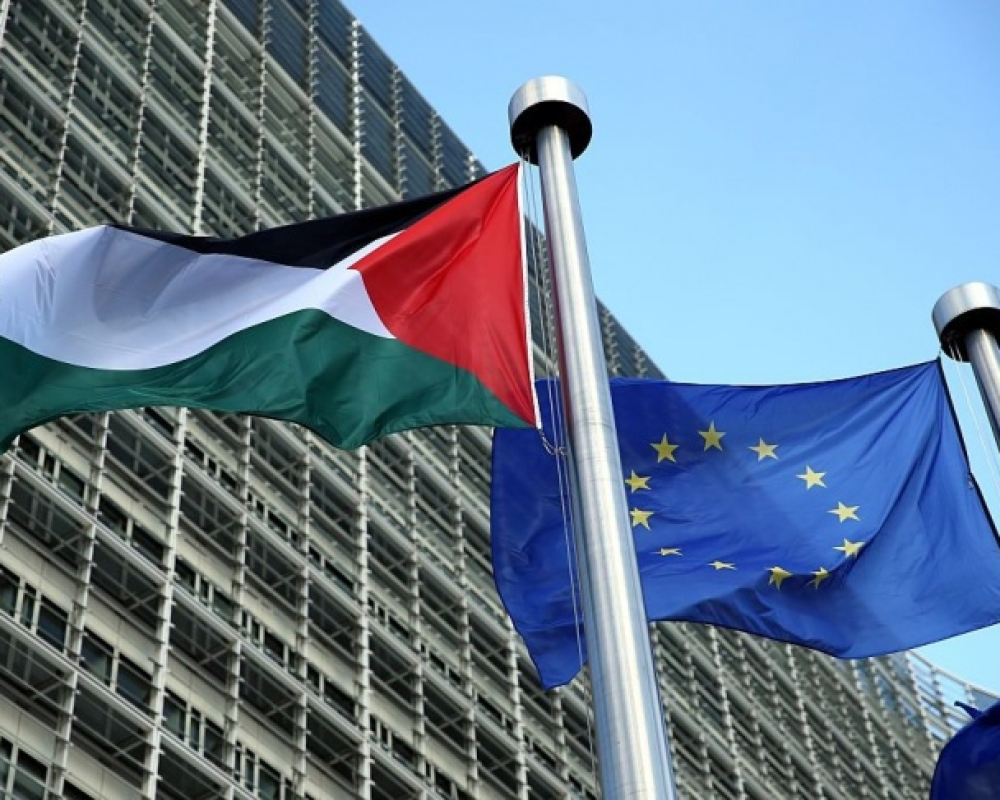
Brussels / Bethlehem / PNN –
Palestinian and European Union officials have indicated the potential suspension of the EU-Israel partnership agreement in light of Israel's ongoing bombings of Palestinian civilians and its failure to comply with the International Court of Justice (ICJ) ruling calling for a halt to the Rafah operation.
The officials, speaking to the Palestine News Network (PNN), also suggested that the EU might increase and allocate more humanitarian aid to the Palestinian Authority (PA).
These statements come amid discussions within the EU about imposing sanctions on Israel if it does not adhere to the ICJ ruling. One proposed sanction is the suspension of the EU-Israel partnership agreement.
Attia to PNN: Suspending the EU-Israel Partnership Agreement is Possible
Adel Attia, Deputy Head of the Palestinian Mission to the EU, told PNN that Spain and Ireland had sent a letter to the European Commission in January, urging a review of the EU-Israel partnership agreement. They argue that Israel violates the principles underlying the agreement, especially Article 2, which states that the relationship between the parties is based on respect for human rights and democratic principles.
Attia noted that the EU Foreign Affairs Council had discussed the matter extensively but had not yet reached a decision. However, he mentioned that an increasing number of EU countries are calling for a review of the partnership agreement and the imposition of sanctions on Israel due to its violations of international law and its refusal to comply with the recent ICJ ruling regarding its actions in Gaza.
Attia emphasized that while the discussion is ongoing, he does not foresee a clear decision in the near future, as suspending the partnership agreement requires a unanimous vote from the EU Foreign Affairs Council, and he indicated that two or three countries are likely to oppose it.
Despite this, Attia highlighted that the EU's discussions about Israel's violations are a significant political message to Israel, signaling that the EU is seriously considering all options for imposing sanctions.
EU Aid to the PA: Not a Substitute for the Arab Financial Safety Net
Attia clarified that the EU is currently unable to increase or provide additional financial assistance to the PA's budget, as such decisions must be included in its annual budget, which was voted on last October. Any increase would need to be part of the new budget to be voted on by the European Parliament next October.
However, he noted that the EU has other tools to provide assistance, particularly in the humanitarian sector to address the crisis in Gaza. The EU has already decided to increase this aid to $150 million for 2024. Regarding direct budgetary aid to the PA, there is currently no mechanism allowing the EU to increase its assistance, meaning only humanitarian aid is currently available.
EU Spokesperson to PNN: Israel Must Respect ICJ Rulings
Shadi Othman, Director of Communications at the EU office in Jerusalem, stated that the EU is discussing potential actions amid the ongoing war, including suspending the partnership agreement with Israel. However, any decision requires the consensus of all member states.
Othman reiterated the EU's stance on the ICJ, emphasizing that it is an international institution applying human rights and international law, and its rulings must be respected and prioritized. He noted that the EU is closely monitoring Israel's compliance with the ICJ's orders.
Othman also mentioned that the EU is discussing various issues, including settlements, and is working on steps and amendments to monitor and address activities on the ground.
He pointed out that the main challenge for the PA is Israel's withholding of clearance funds, which are crucial for the PA's budget. The EU consistently calls on Israel to release these funds and comply with the Paris Economic Protocol.
Othman confirmed that the EU fulfills its financial commitments to the PA while urging regional and international parties to meet their obligations.
Sobh: Discussing Suspension of the EU-Israel Partnership Agreement is Significant
Dr. Ahmed Sobh, head of the Political Committee of the Fatah Revolutionary Council, commented on the EU-Israel relations, stating that the EU, with its 27 member states, is a partner to Israel similar to the United States because it remains silent about Israel's crimes. He stressed that the EU should take a different stance on its relationship with Israel.
Sobh noted that the economic partnership agreement is crucial for Israel, particularly in advanced technology and diamond polishing, which is Israel's second most important trade sector. Thus, suspending the agreement would be a significant step.
He added that merely discussing the suspension of the partnership agreement marks an important recognition of the State of Palestine, signaling a clear shift in the EU's position since October 7. Despite this historical context, the recent diplomatic and academic efforts have started to change the EU's stance, although the suspension discussion requires time and consensus.
Sobh pointed out that some EU countries, such as Hungary, the Czech Republic, and Austria, align more with Washington than Brussels, diverging from traditional European values regarding Palestine and other global issues.
He stressed the importance of the relationship between Palestine and the EU, stating that if Europe intends to play a greater political role beyond its economic influence, now is the time to raise its political stakes in Palestine and the region.
Sobh concluded that while EU aid cannot replace the Arab financial safety net, it is crucial to activate this safety net. Despite longstanding investments and bilateral agreements, some EU countries still delay their aid to the PA.